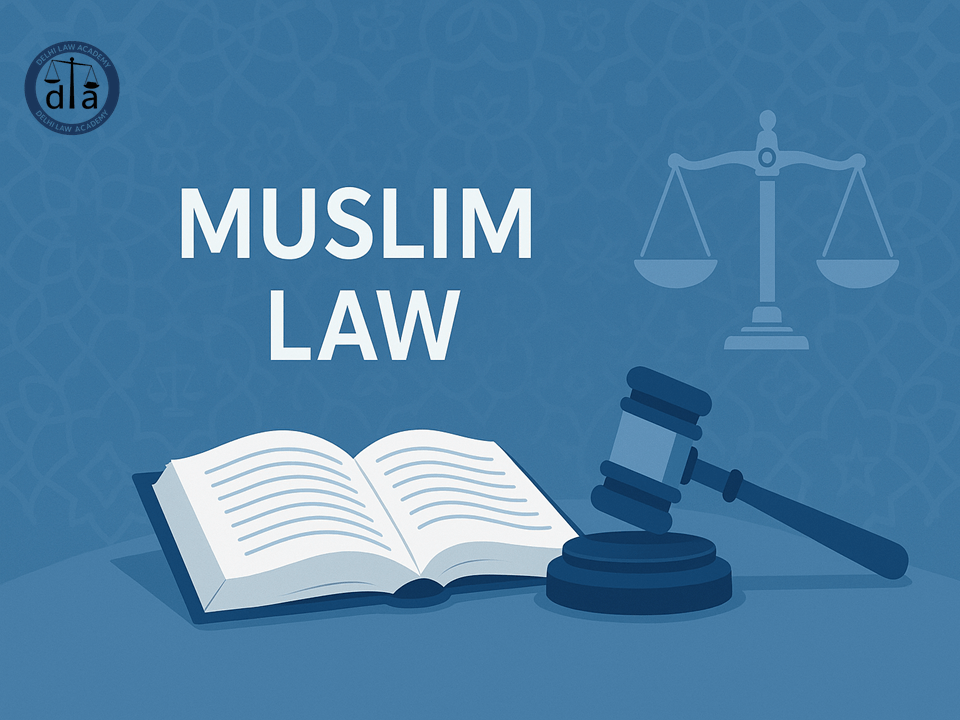
📝 Preparation for RJS, DJS, PCS (J) and Other Judicial Service Exams
⚖️ GHULAM SAKINA v. FALAK SHER ALLAH BAKHSH [1950 LAH]
The sole question for decision in this case is whether the plaintiff had repudiated her marriage in accordance with the requirements of S. 2, Dissolution of Muslim Marriages Act, 1939.
“Puberty” under Muhammadan law is presumed, in the absence of evidence, on completion of the age of 15 years.
Muslim Law is an important component of most Judicial Service exams in the country. Its thorough knowledge is a must for all aspirants of RJS, DJS, PCS (J) and other Judicial Service exams. To help such aspirants, DELHI LAW ACADEMY JAIPUR has launched a series of study material modules on all important aspects of this important part of their syllabus.
📚 Case Details: Ghulam Sakina v. Falak Sher Allah Bakhsh [1950 Lah]
This second appeal by the plaintiff arises out of her suit for dissolution of marriage. It was alleged that she was never given in marriage to the defendant as he proclaimed it to be, that if any such marriage be held to have taken place during her infancy she never approved of it and had repudiated it, and that she was a Sunni girl and the defendant was a Shia and the marriage between them was not good.
The defendant maintained that the marriage was performed by her father when she was five years old, that his marriage was an exchange marriage in lieu of the marriage of his own sister with the uncle of the plaintiff, and that the parties had lived for some time as husband and wife and the marriage had been consummated. It was denied that the defendant was a Shia; both the parties belonged to the Sunni sect.
The trial Judge found that the plaintiff was married by her father during her infancy in 1932 and that there was no credible proof of the consummation of marriage. On these findings, the plaintiff was awarded a decree.
The marriage between the parties is recorded in the marriage register marked Ex. D-2. It was performed by the father as guardian on 23rd November 1932. The father examined as P.W. 1 had to admit this. The plaintiff, according to the birth entry produced by her, was born on 13th November 1931, i.e., she was about a year old when the marriage is said to have been celebrated.
🔹 Legal Issue
The sole question for decision in this case is whether the plaintiff had repudiated her marriage in accordance with the requirements of S. 2, Dissolution of Muslim Marriages Act, 1939. The relevant portion is reproduced below:
A woman married under Muslim law shall be entitled to obtain a decree for the dissolution of her marriage on any one or more of the following grounds:
(vii) that she having been given in marriage by her father or other guardian before she attained the age of 15 years repudiated the marriage before attaining the age of 18 years, provided that the marriage has not been consummated.
It would not be disputed that the plaintiff was married by her father long before she was 15 years old, and the suit for dissolution of marriage was instituted on 29th August 1945 when she was about 14 years old according to her birth entry and about 17 years old according to medical testimony; in any case, before she attained the age of 18 years.
🧾 Evidence and Findings
The evidence as to the alleged consummation is of very unsatisfactory character. The approximate time at which this took place was not specified in the statement filed by the defendant.
The learned District Judge held the consummation of the marriage proved as no less than two persons who were examined as respectable witnesses by the plaintiff admitted in the lower Court that the marriage had been consummated. It is immaterial that they were related to the defendant because in cases of the present type the relations of the parties are the most natural witnesses and their evidence is entitled to due weight.
The two persons referred to by the learned District Judge were apparently P.W. 2 and P.W. 7, the former is the brother of the defendant and the latter is the father. Both these persons had to be examined with reference to some of the letters exchanged between the father of the plaintiff and the defendant’s father. These letters indicated that the plaintiff’s father was not willing to send her to the house of the defendant and the marriage was said to be no longer in force. The correspondence clearly revealed that during the year 1944 there were dissensions between the couple and they did not live together.
The refusal of the plaintiff to have her examined by a lady doctor could not be taken to be proof of the consummation of marriage which should have been proved as a fact on the consideration of the entire evidence in the case.
📌 Option of Puberty
The real significance of “option of puberty” and the manner in which it is to be exercised seems to have been not properly grasped or appreciated. The marriage under Muhammadan law is in the nature of a contract and as such requires the free and unfettered consent of the parties to it. Normally, a man and a woman should conclude the contract between themselves, but in the case of minors, i.e., who have not attained the age of puberty as recognised by Muhammadan law, the contract might be entered into by their respective guardians.
“Puberty” under Muhammadan law is presumed, in the absence of evidence, on completion of the age of 15 years. It would, therefore, necessarily follow that the minor should exercise the option after the age of 15 years unless there was evidence to the contrary that puberty had been attained earlier and the burden of proving this shall lie upon the person so pleading. Anything done by the minor during the minority would not destroy the right which could accrue only after puberty. The cohabitation of a minor girl would not thus put an end to the “option” to repudiate the marriage after puberty. The assent should come after puberty and not before, for the simple reason that the minor is incompetent to contract; nor should the consummation have taken place without her consent.
In the present case, the plaintiff at the time of the alleged consummation was still below 15 years and assuming consummation to be a fact, it could not destroy her right to repudiate the marriage after she had attained the age of 15. She had three years within which to proclaim the exercise of that right, and the institution of a suit was one mode of proclaiming it. The plaintiff had not therefore lost her right to repudiate the marriage given to her by law.
📚 Continue Your Muslim Law Preparation
Don’t stop here! Strengthen your knowledge of Muslim Law with our blogs:
📘 Free Study Material for Judiciary Aspirants!
Download our FREE study material prepared by Delhi Law Academy’s expert faculty.
❓ FAQs: Ghulam Sakina v. Falak Sher Allah Bakhsh [1950 Lah]
“Puberty” under Muhammadan law is presumed, in the absence of evidence, on completion of the age of 15 years. A minor can repudiate a marriage after attaining puberty, even if the marriage was solemnised earlier by her guardian.
Yes. Under S. 2 of the Dissolution of Muslim Marriages Act, 1939, a woman given in marriage before attaining 15 years can repudiate the marriage before 18 years, provided the marriage was not consummated.
Consummation must be proven with credible evidence. In this case, witnesses related to the parties were examined, but refusal of a minor to be medically examined cannot destroy her right to repudiate.
Even if consummation occurred before puberty, the minor retains the right to repudiate after attaining the age of 15. Any act during minority does not extinguish this right.
Yes, guardians may contract marriage for minors. However, the minor must exercise the option of repudiation after puberty if she did not consent, preserving her right under Muslim law.
The court held that the plaintiff had the right to repudiate the marriage as she was underage at the time of marriage. The appeal of the plaintiff was accepted, and the suit of the defendant was dismissed.
Contact us
📍 Delhi Law Academy – Jaipur Branch
6C, Tower 2, Coaching Hub, Pratap Nagar, Jaipur – 302033
📞 Phone:
+91 9911916552
+91 8447285606
✉️ Email:
contactus@delhilawacademy.com

